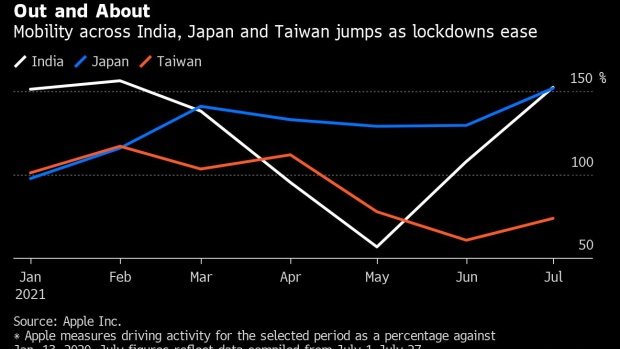Jul 29, 2021
Thai Streets Empty as India Traffic Jams Return, Apple Data Show
, Bloomberg News

(Bloomberg) -- With the delta variant of Covid-19 roiling the Asia-Pacific, where vaccination rates remain low, activity on roads and highways provides vital clues to each country’s success at controlling the pandemic that’s claimed millions of lives worldwide.
Data compiled by Apple Inc. show a jump in mobility across nations such as India as it emerges from a deadly wave and eases lockdowns amid falling infection figures. More traffic has also been observed in Japan despite rising virus cases and calls for a wider declaration of a state of emergency with the Tokyo 2020 Olympics under way.
See also: Gasoline Swings Back to Growth in India as Covid Trauma Recedes
India witnessed the biggest gain in driving activity after restrictions and curfews were rolled back as daily infection rates dipped. Traffic snarls returned to the streets of New Delhi, its capital, as people headed back to offices, dined in restaurants and returned to the malls after weeks of curbs.
Biggest Losers
Across Southeast Asia, emptier streets were seen as Indonesia emerged as a major center of the pandemic. Daily Covid-19 deaths climbed to a record 2,069 earlier this week even after President Joko Widodo ordered malls to shut and slapped more restrictions on businesses in Java and Bali.
Thailand reported its highest single-day increase in infections since the pandemic began, with the country’s health ministry forecasting the current wave to begin easing by October. In the Australian city of Sydney, further restrictions on travel and increased penalties for non-compliance were rolled out as the outbreak of the delta virus variant reached a new peak.
Global oil refiners are facing an uncertain period as resurgences threaten the short-term demand outlook. Flare-ups have weighed on the recovery led by gasoline, even as more Europeans hit the roads and America’s usage reaches pre-pandemic levels.
©2021 Bloomberg L.P.


